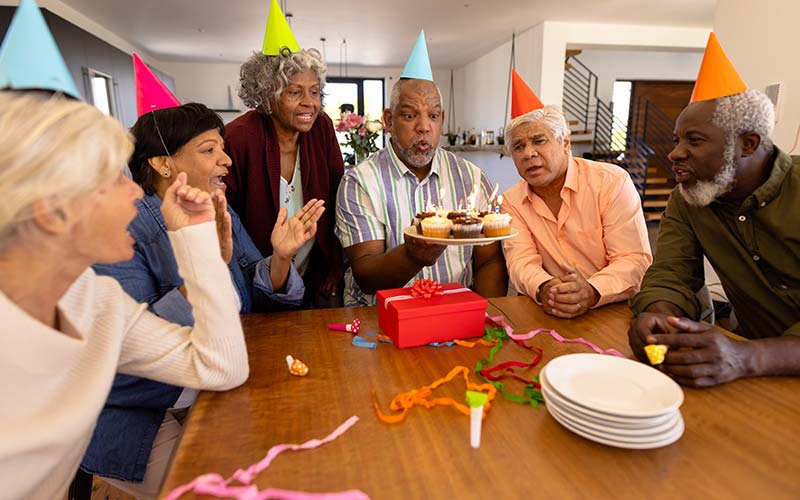Being proactive makes the transition easier
Let’s face it. Aging can be a scary thing. One minute, Mom is running errands like she did when she was shuttling you to events and practices, and the next, she’s having trouble doing simple things around the house. It can be a bit of shock when you realize the shift. At this point, many people find themselves in mad-dash-mode, scrambling to find Mom alternative living arrangements or additional assistance.
However, it doesn’t have to be this way. There are a lot of things you can do to be prepare for this time of life and make it a more gradual transition, versus the hectic and daunting alternative.
Here are some things you can do, to not only be ready, but have an amazing plan in place so that you, Mom (and Dad) are ready, when the need arises.

1) Have that conversation now
Literally now. Okay, if you’re reading this at 2AM, don’t wake mom up. What we really mean by this, is at the next appropriate opportunity, begin discussing what the transition would look like.
This becomes really important if you think your aging loved one might be resistant to the discussion. The sooner you break down the barriers of this conversation, the sooner you can get over the awkwardness, and start making plans for when things might be needed.
Remember when they started talking to you about your future? Are you going to college? What do you want for a career? Are you going to live more than five miles from home, if so how often will you be visiting?
Same principal. They were trying to get you to think ahead, because your life was going to be heading in a different direction very soon. For an aging loved one, it might be approaching soon, or it might be years and years away. But getting ready now, will make everything so much easier when the plan is needed.
To start, you will need an overview of what they would prefer, when the time comes that they’ll no longer be able to fully take care of themselves. You can ask if they have a plan in mind. This should be a calm, positive conversation, where you’re both working towards the same goal. If they’re resistant, it can be helpful to stress that this is their plan and they’re in control. You’re just there to make sure it comes to fruition.

2. Find a senior placement specialist
You might not even be aware that this exists, especially if this hasn’t been on your radar, but there are people – let’s call them angels – who specialize in working with families to identify senior care needs, and formulate a plan, to help them find the right living and social solution, regardless of what level of care they might need.
The thing is, it’s never too early to get someone involved, who knows the ins-and-outs of senior care, such as independent and assisted living facilities, in-home care services, private pay rehab options, the best memory care options and general senior placement solutions.
These people are there to help you navigate everything from benefit options (especially the hidden ones you know nothing about), all available care options based on the level of need, and pretty much any other resource you can think of to make sure the care they will need is matched with them continuing to live their best life.
A senior placement specialist can assess the current situation, at any time, and help you all formulate a good plan of action to prepare Mom for a thriving future.

3. Assess the Financial Situation
While we’re on the subject of senior placement specialists, and the fact that it is literally never too early to involve them, let’s also touch on the topic of Mom’s financial situation. Although there are care facilities for virtually everyone who needs it, mom’s finances are going to play a very pivotal role in deciding the types of places available to her. This will also determine which benefits will apply to her placement, when that time comes.
It is entirely possible that the cost of in-home care might be similar to the cost of assisted living. Very often, adjustments to the home will be needed. These alterations can be done ahead of time to prepare and possibly avoid unsafe living circumstances. Again, a senior placement specialist will be able to help you foresee what changes you’ll want to make.
Having a good grasp of the money situation might be scary at first. Hence, why most people avoid it all together. Unfortunately, that strategy typically leads even more confusion and frustration down the road. It’s truly a vital factor in Mom and Dad’s future.

4. Involve the rest of the family
You don’t have to approach this subject with Mom and Dad alone. In fact, you shouldn’t. This is a family matter and it’ll be important to involve as many trusted members, as is appropriate.
Your siblings, and perhaps other family members, need to be aware that this needs to be a discussion early. Like Mom and Dad, they might be resistant to this.
“Why are we talking about this now? Mom’s fine.”
“Dad has a long way to go before we get into this.”
This is exactly the right time to talk about it. Yes, you might face resistance. Yes, you might be seen as a family annoyance. That’s okay. Someone needs to do this. And if you don’t want to be the only one looking out for Mom’s care at the last minute, get these people on your team.
In the long run, everyone will be really glad you started the process of planning. Especially when the time comes for your aging loved ones to adopt new living arrangements.

5. Get an idea for where they will live
If you’re being proactive, it isn’t likely Mom has taken much time to think where she will live, when her home outpaces her physical capabilities. Now is a great time to start that conversation – especially if you’ve received advice from an advocate to help prepare you for what may come.
Where does Mom want to live? What kind of social community and amenities would she like to see in her new place?
It is never too early to start looking at places as well. A placement advocate can help set up visits for Mom to take a look at places and allow her to get an idea of where she feels she might fit in best.
With this in mind, you can start to relax, knowing that Mom has options.

6. Talk with a Senior Real Estate Specialist (SRES)
Mom might not be ready to sell her home for some time, but in this planning phase, it never hurts to find an agent you can trust to sell their home when it’s time. Senior Real Estate Specialists differ from a standard agent in several ways, as they offer the exact level of service you and your family will need.
The first, and most important, they absolutely understand the need for compassion in the home sales process. They are acutely aware that the sale of Mom (or Dad’s) home is often a lonely one and there are a great many factors involved. Their job is to not only sell the home, but to make it as easy on the family as possible.
They are also very aware that this kind of sale is often going to involve the need to fix some things up at the home. It isn’t uncommon at all for the house maintenance to move to the back burner as Mom and Dad begin to slow down. SRES agents are used to this and will advise you every step of the way.
The goal of an SRES agent is to make use of their vast connections to make Mom’s home market ready and make sure the house is sold with the respect it deserves and the dignity Mom deserves.

7. Get social
Too often, Mom and Dad get stuck in a rut and just hang out at home. They get into their own routine, hang out with the same friends ( if that ) and do the same things. All the time.
There are a lot of great opportunities for Mom and Dad to get out and meet new friends. Some independent living and assisted living communities even have social events they can go to, have fun and interact with new friends. If they’ve decided on a community they like, but aren’t ready to make that move yet, check and see if they have social events that are open to the public.
At AdoreMOM, we regularly have a social event called “Adore Social,” designed to celebrate those who are 55 and over. We’ll be posting these events on our website, so stay tuned!

A life that blossoms
When we take the proactive approach, we enable Mom (and Dad) to relax and not worry as much about their future. In turn, we also worry less, and, bonus, feel less guilty about how much help we may , or may not, be able to provide.
In opposition, being reactive often causes us to scramble, panic and lose sight of what’s most important: making sure Mom and Dad live a life that blossoms into ultimate fulfillment.
These steps to proactivity will help Mom’s future transition much easier. And you’ll add a little piece of mind to the family too.

